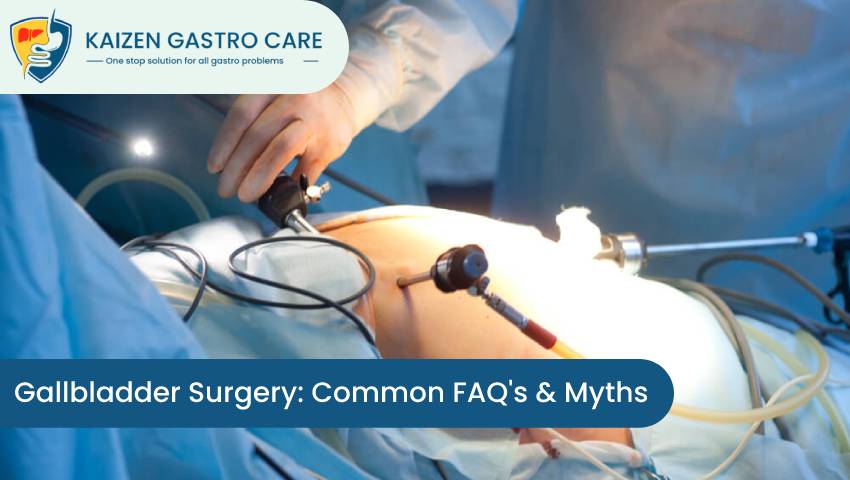
- 04/03/2023
- Kaizen Gastro Care
- 0 Comments
- Digestive Disorder
Gallbladder Surgery: Common FAQ’s & Myths
Gallbladder surgery, also known as cholecystectomy, is a common surgical procedure that removes the gallbladder. This small organ is located on the right side of the abdomen and is responsible for storing and releasing bile, which helps to digest fats. Gallbladder surgery is typically performed when there are gallstones or other issues with the gallbladder. However, there are many myths and misconceptions about gallbladder surgery that can cause confusion and anxiety. In this blog, we will address some common FAQs and myths about gallbladder surgery.
FAQ's:
The most common reason for gallbladder surgery is the presence of gallstones. These are hard deposits that form in the gallbladder and can cause pain and other symptoms. Other reasons for gallbladder surgery may include inflammation, infection, or tumors.
There are two main types of gallbladder surgery: laparoscopic cholecystectomy and open cholecystectomy. Laparoscopic cholecystectomy is a minimally invasive procedure that uses small incisions and a camera to remove the gallbladder. Open cholecystectomy is a more invasive procedure that requires a larger incision.
The recovery time for gallbladder surgery varies depending on the type of surgery and the individual patient. In general, patients can expect to return to their normal activities within a few weeks after laparoscopic cholecystectomy and several weeks after open cholecystectomy.
As with any surgical procedure, there are potential risks and complications associated with gallbladder surgery. These may include bleeding, infection, injury to nearby organs, and digestive problems such as diarrhea or constipation.
Myths:
Myth 1: You can't live without a gallbladder.
Fact: While the gallbladder plays an important role in digestion, it is not essential for survival. After gallbladder surgery, the liver will continue to produce bile, which will flow directly into the small intestine.
Myth 2: Gallbladder surgery is always painful.
Fact: While some discomfort and pain are common after gallbladder surgery, it is typically well-managed with medication and resolves within a few days to weeks.
Myth 3: Gallbladder surgery will cause significant weight gain.
Fact: While some people may experience weight gain after gallbladder surgery, it is not a direct result of the surgery itself. Weight gain may occur due to changes in diet or activity levels after surgery.
Myth 4: You can't eat fatty foods after gallbladder surgery.
Fact: While it may be advisable to avoid fatty foods immediately after surgery, most people are able to resume a normal diet within a few weeks. However, some people may experience digestive issues with high-fat meals and may need to make adjustments to their diet.
